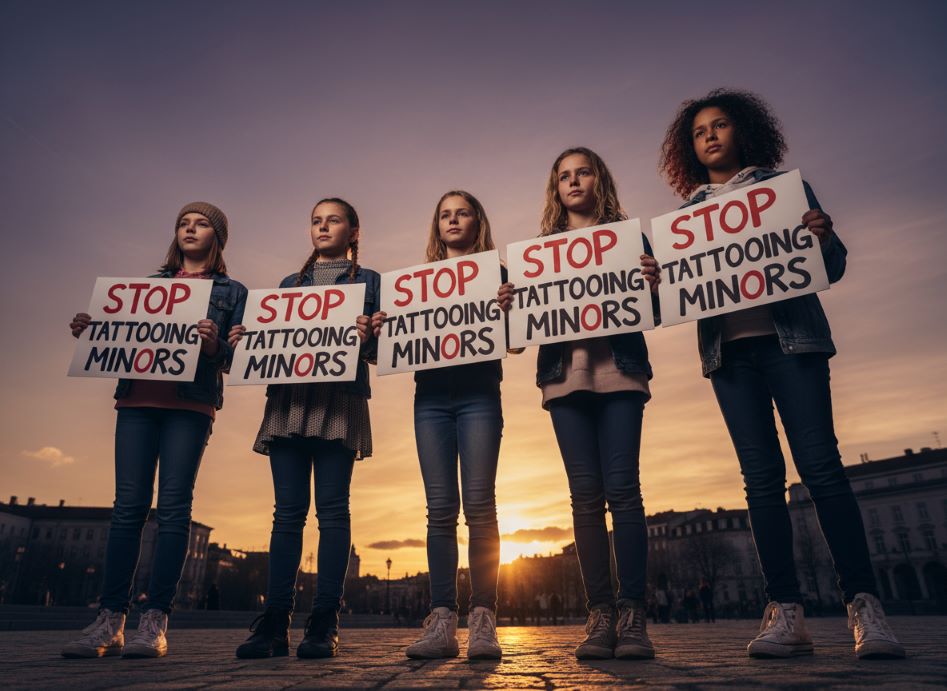So let us now turn our consideration to a rather thorny topic, a subject which falls at the curious junction of human freedom, parental anxiety, and the sober business of boring holes in the skin with needles filled with indelible ink. I refer, of course, to the question of tattoos — or, more specifically, whether the young, those mercurial beings of uncouth birth under the age of eighteen, should be permitted to obtain them! Body-art has, you see, undergone the most remarkable transformation in the past few years. The profession of the tattoo artist has been practically robbed of its charm.
It was once the privileged past-time of sailors, circus performers, and (it pains one to say it) persons of no particular erudition; but now it is fulfilling a pretty severe need in the body-embellishing discipline well known to the ancients. All these considerations only strengthen the public history of tattooing when one is asked what light it may throw upon society. If one goes down any of the principal streets, if one looks into any lecture room at any one of the universities, one will find the skin of a banker, a barrister, a botanist in fact, for every letter of the alphabet, adorned with tattooings of arabesques and other pictures.

The public stigma that once attached to tattooing has made pretty much a ventilating, like the dew on the morning grass in summer. But if we take the persons under the age of eighteen, that magic limit of legal culpability both civil and criminal, the waters evidently become very much turbid indeed. The whole subject is enveloped in the same shadowy complications as the phases of the subject of minor drinking, and reveals an extraordinary arrangement like the unfolding of a complicated origami swan, and becomes complicated still further by the existing casual restrictions of law, morality and ethical aspects peculiar to the many circles of culture at present. So let us investigate the reasons for the regulatory concerns about the tattooing of minors, the rules that regulate the tattooing business as such, the manner in which the various ethical problems arising are complicated, the opinion existing about the tattooing of minors, and generally what the various parties might easily, without much difficulty do as regards to matters.
Understanding Tattoo Laws for Minors
The legal position relating to tattooing minors is regrettably as coherent and clear as English weather in April. In the United States of America there is no overall Federal law to this effect. It remains, therefore, with the different States, which have made their own particular rules in relation to the matter. A regular patchwork quilt of legislation!
Most of the States have settled down to recognizing the age of eighteen years for tattoos. The reason (apart from the fact that the lawyers do not think it right otherwise) is that the law supports the view that minors are not in a position to bind themselves by contracts or give what lawyers call informed consent. This is not legal pedantry. It is the recognition of a fact which has been known to the scientific world for many years. It has been shown that the prefrontal cortex of the brain — the part that is responsible for impulse control, forethought and the power of refraining from tattooing “Yo Lo” athwart the forehead — are not mature until you are about twenty-five years of age. For more on this, see the NIH’s research on brain development in adolescents. Eighteen years, therefore, is a happy compromise between the two views of the case, protection and independence.
But there are some States that permit minors to get a tattoo with their parents’ consent and they often have to be present during the operation. One pictures the mother’s face when the child says, “Yes, Mummy, I quite fancy getting a dragon rampant eating a unicorn on my shoulder blade! Thanks!”
Parental Consent Laws Explained
The UK Tattooing of Minors Act 1969 prohibits the tattooing of anyone under the age of 18 except in the case of medical tattooing, and thus, tattooing under the age of 18 is a criminal act. There is no question of parental consent, there is no exception (unless, naturally, one was tattooing over an unfortunate scar or port wine stain). Whether or no such an act of Parliament was necessary is a question which may be debated, but the decision of the British Parliament in its wisdom was that this was one of the things to which the discretion of parents should not be applied. This is rather a Victorian attitude, but we perceive that it simplifies matters very considerably.
The laws in these cases are with the double view of preventing the complication of physical health in the first place, as well as the deprivation of youth in giving them the power of making irretrievable and unhappiness-filling decisions. Understanding informed consent requirements is essential for both parents and artists navigating this complex landscape.
Consequences for Artists and Studios
Tattooing artists who pursue their profession on minors with whom they have failed to observe all the necessary legal requirements must contemplate the disagreeable possibilities of such penalties as heavy fines, suspension or total striking out of business, and in certain localities possible criminal misdemeanor charges. This is no light matter. Apart from the legal view of the question, there is the professional one — loss of prestige. Any reputable studio must maintain strict hygiene and safety standards. The success or the contrary in such lines of endeavour depends so much on good word-of-mouth recommendation, possible liability for consequences arising from regrets or complications by reason of bad health accruing and collateral results, and also the disagreeable notoriety to be gained by being known as “that artist who does not obey the laws.”
Ethical Considerations of Youth Tattooing
Which brings us to the yet more serious thicket of ethical considerations. The law, you see, tells us what we can or cannot do, but Ethics asks what we ought to do, and the point here is a fine and important distinction.
The important ethical distinction between tattooing an adult and tattooing a minor lies in the power of understanding and consent. Informed consent requires three things — the ego power to understand the necessary facts, the power to comprehend what these facts mean in relationship to one’s self, and the power of mind to choose — to think of one’s relationships and the consequences that follow from them. Most developmental psychologists and ethical writers seem convinced — and I am inclined to believe rightly — that these powers have not fully developed in minors, especially as applied to the future, to the foresight of years, to the appreciation of long, long time regrets.
The adolescent mind is a wonderful thing, but it needs to be developed. Neurological studies show a great disharmony, for instance, between the development of the emotional and reward-getting part of the brain — the limbic system — and the part of the brain — the prefrontal cortex — that is responsible for impulse control and thinking things out. One can see therefore why adolescents are distinguishably capable of connections of wonderful creativity, and also, alas, of terribly bad judgments about things which seem to them exceedingly important during part of their lives, all within the same afternoon.
Long-Term Implications for Teens
This is where the permanence of the tattoo becomes alarming. A tattoo at sixteen may pose ideas of vitality of profound significance to the self at that age. The tattoo may denote a love for a favorite rock group, or it may be a sign of undying affection for a high school friend whose name is Brittany. At twenty-six, thirty-six, and sixty-six, however, these ideas may become extraordinarily unprofound where concerned with mental comprehensiveness or possible far-reaching regret. Our tastes change and our values shift; in fact, our very identities are quite different between puberty and adulthood. The person you are at 16 is, from a psychological and neurological point of view, a creature quite different from that which you’ll be when you are 30.
Then there’s the practical aspect: social stigma (which, though the world’s evolving attitude toward tattooing has not entirely removed it, is still apparent), job opportunities (particularly in conservative fields) and the results of bodily changes as the years go by. That fragile butterfly on this person’s belly may, after childbearing or bodily expansion, develop a more Pterodactylian appearance. For those facing regret later in life, understanding how tattoo cover-ups transform regrets into new art offers some reassurance.
Then there is the ethical question, Should we permit the young minors of the population to make choices which are irreversible without the complete maturity of mind? The opponents of permitting the tattooing of minors, even with parental permission, say that to permit the young to tattoo puts the whole responsibility on the youth or the parent and the tattoo trade makes money out of juvenile impulsiveness. The advocates on the other side say that to prevent the tattooing of minors is to deny them rights of creative expression and personal liberty. Both sides are right to a degree, and that is precisely why it is so damnably complicated. For a deeper understanding of this psychological journey, see our guide on navigating tattoo regrets.
Cultural Perspectives on Minor Tattoos
Tattoos today are, in fact, cultural signposts, identity signs or narrative tattoos as personal identity markers. Certainly in the field of youth culture they are indications of the existence of a local identity, revolt, memory, aesthetic need, etc. They are a medium of party loyalty stating in effect “This is me” or “This is what I count” in an age when humanity reveals its intensely ephemeral and uncertain nature. However, in situations where minor children obtain tattoos, the cultural meanings become intertwined with social pressures like peer pressures, parental pressures, mass media images and, if truth be told, the obnoxious tyranny of social media approval.
How many young people, it may be asked, get tattoos not because they are sincerely dedicated to having them but because they see them portrayed favorably on Instagram, or because all of their friends are having them? From the public point of view, this practice raises rather embarrassing questions: Do these tattoos represent the authentic empowerment of the tattooed or subtle exploitation? Are those parents who give their approval to their children’s tattoos being progressive and helpful to their children? Or are they neglecting their responsibility to protect them against their own poor ideas? Is the tattoo artist simply satisfying a legitimate demand or is he/she stimulating premature decisions?
The balancing act between the autonomy of youth and parental responsibility becomes gloriously impossible to understand. Moreover, there are such vast differences in cultural attitudes about body modifications that the problem takes on an even larger aspect. In some cultures the body is the gift of the parents and ancestors and changing it about is a form of disrespect. In others, it is a ceremonial rite of passage. Such differences in cultures appear in drastic differences in laws and ethical structures, and reflect without fail the fact that there is no universal answer to the question.

Youth Culture and Self-Expression
Legal compliance should be your point of departure, not your goal. Consider these additional suggestions:
Careful verification: Don’t either glance or scan identification: examine it carefully. Require parents to be present whenever the law requires it, and then make careful records of everything that transpired.
Be thorough in your education: Both the minor and parent should fully understand that a tattoo is a permanent decision, as well as any implications for health (infection, allergy, scarring), that removal will be expensive and painful, that there can be ramifications toward employment and social acceptance in the distant future. Understanding tattoo removal options before getting inked is equally important.
Have a waiting period: It is a good practice to have cooling off periods even if not mandated by law for clients under eighteen. Require multiple consultations before proceeding with the tattoo. If someone’s determination begins to weaken during the waiting period, then that person was not ready.
Retain the right to refuse: Parental consent does not, without more, make a procedure ethical. If it feels wrong to you, if the minor seems coerced or uncertain or immature, do not perform the procedure. Your integrity is worth more than your money.
Practical Guidance for All Parties
For Parents: Questions to Ask
Engage in sincere dialogue: What does this tattoo mean to your child? Is this a decision of thought or whim? What will it mean five or ten or twenty years from now?
Consider alternatives: Suggest henna, temporary tattoos or other forms of non-permanent body art until your child achieves legal age. If these alternatives are accepted, then you can know that the desire is sincere if after having these the child later wants a tattoo.
Investigate thoroughly: Check out the qualifications of the artist, the sanitary conditions of the studio, how the studio checks out ages, what the realistic cost of possible future removal is.
Encourage meditation on the decision: Suggest to the minor that the decision be revisited in six months. If the determination is the same at that time, the tattoo can wait. If enthusiasm for it is found to be evanescent, then your child has been saved from possible remorse here.
Future Trends and Policy Changes
Social media and body-modification culture’s growing strength might indicate a growing rather than a declining market for adolescent tattoo research. This poses some important questions for legislators and regulators of the industry:
Should there be a strict universal minimum age, such as eighteen, and provide no exceptions for parental consent? Would it be advisable to have universal first-wait periods, or compulsory parental education classes on the relative merits of youth tattooing? How can we possibly monitor compliance with such suggestions, and yet leave sufficient latitude for freedom of the individual? What cultural shifts are taking place concerning bodily autonomy and the rights of youth and how does this fit in with our models for protection?
At present such questions cannot be answered easily, and they do not lend themselves to easy answers. They require thought as to their ultimate meaning, they require empirical studies and the sincere consideration of the various interests involved.
Making the Right Decision
The tattooing of minors is virtually at the intersection of self-expression, youth culture, and adult supervision. There are regulatory matters, questions of ethics and usage, new cultural shifts, and all to enhance demand. If you are a parent, a youth thinking of a tattoo, or a professional tattoo artist, you have to evaluate a number of important criteria before anyone makes a decision: the untaken-for-granted permanence of the statement, the developing capabilities of youth, the burdens of responsibility of adult supervision, cleaning, tending, and bettering on tattoos.
The pigment of ink, you see, is not merely congruent with expressions of pattern but is also clearly indicative of the human decision-making opportunities and consequences that go with the decision. Similarly, tattoos in a particular sense are parts of a story, part of the outward physical man, the public projected image of the self to the rest of humanity. This surely is a lot of weight to carry for any adult to shoulder, to say nothing of a fellow who is still having some construction done on his brain development and peered at long-term through the theurgic concepts of immaturity.
So here is my thought that I put out: go slow, question thoroughly, make the decision clear and conscious only when it is arrived at with the notions of clear maturity, clear meaning, inquiry, and regard for the future self that has a stake in these choices. If you are a parent or a youth thinking of a tattoo — right now is the time for pause. Reason through the process. Ask the questions hard. Wait. Reflect. If you be a tattoo artist, ask yourself the perennial questions with regard to your policy structure and your ethical attitude.
For at bottom we are not talking about merely ink and skin. We are talking about a medium wherewith to aid youth to survive the ever dicey passage between childhood and adulthood without acquiring permanent decisions of their trip along the way before they have reached the stage of wisdom where they can choose them well.
And it is in this context of service, ultimately, that we owe that real reflection to the youth of today.


